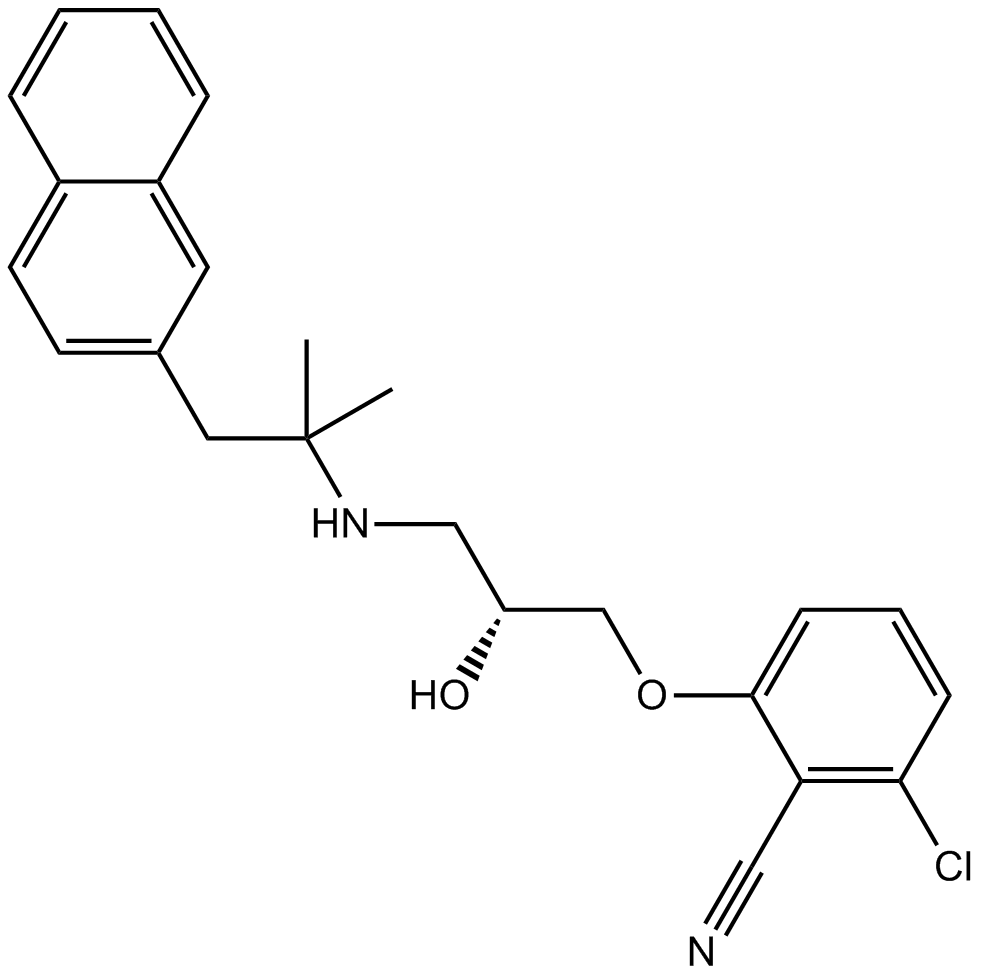NPS-2143 |
| Catalog No.GC16943 |
NPS-2143?is a calcification drug that acts as an antagonist of the calcium-sensing receptor (CaSR) and consequently stimulates the release of parathyroid hormone.
Products are for research use only. Not for human use. We do not sell to patients.

Cas No.: 284035-33-2
Sample solution is provided at 25 µL, 10mM.
NPS-2143 is a calcification drug that acts as an antagonist of the calcium-sensing receptor (CaSR) and consequently stimulates the release of parathyroid hormone[1].
Treating Cortical nontumorigenic adult human astrocytes(NAHAs) with fAβ25–35 alone significantly increased at 48 h the release of cytokines and chemokines into the conditioned media. However, NPS-2143(100nM) effectively hinders the Secretion of cytokines and chemokines: IL-6, MCP-2, RANTES, and s-ICAM-1 from NAHAs[2].
NPS-2143 significantly reduced cell proliferation with halfmaximal (50%) inhibitory concentration (IC50) values of 4.08 and 5.71 μM in MDA-MB-231 and MCF-7 cells, respectively. NPS-2143 induced caspase 3/7 activation in MDA-MB-231 breastcancer cells which was accompanied with a remarkable reduction in the expression of Bcl-2antiapoptotic protein. NPS-2143 suppressed migratory and invasive abilities of MDA-MB-231cells with a significant reduction in the expression of p-ERK1/2 and integrin β1 proteins.NPS-2143 to suppress proliferative, migratory andinvasive effects of breast cancer cells which was accompanied by caspase 3/7 activation andsuggests the potential of NPS-2143 as a promising anti-cancer molecule in breast cancer[3].
NPS-2143 was administered as a single ip bolus to wild-type and Nuf mice and plasma concentrations of calcium and PTH, and urinary calcium excretion measured. In vitro administration of NPS-2143 rectifying the gain-of-function associated with the Nuf mouse CaSR mutation. Intraperitoneal injection of NPS-2143 in Nuf mice led to significant increases in plasma calcium and PTH without elevating urinary calcium excretion. These studies of a mouse model with an activating CaSR mutation demonstrate NPS-2143 to normalize the gain-of-function causing ADH1 and improve the hypocalcemia associated with this disorder[4].
References:
[1].Wang S, Qiu L, et al. NPS - 2143 (hydrochloride) inhibits melanoma cancer cell proliferation and induces autophagy and apoptosis. Med Sci (Paris). 2018 Oct;34 Focus issue F1:87-93.
[2].Chiarini A, Armato U, et al. CaSR Antagonist (Calcilytic) NPS 2143 Hinders the Release of Neuroinflammatory IL-6, Soluble ICAM-1, RANTES, and MCP-2 from Aβ-Exposed Human Cortical Astrocytes. Cells. 2020 Jun 2;9(6):1386.
[3].Alqudah MAY, Azaizeh M, et al. Calcium-Sensing Receptor Antagonist NPS-2143 Inhibits Breast Cancer cell Proliferation, Migration and Invasion via Downregulation of p-ERK1/2, Bcl-2 and Integrin β1 and Induces Caspase 3/7 Activation. Adv Pharm Bull. 2022 Mar;12(2):383-388.
[4].Hannan FM, Walls GV, et al. The Calcilytic Agent NPS 2143 Rectifies Hypocalcemia in a Mouse Model With an Activating Calcium-Sensing Receptor (CaSR) Mutation: Relevance to Autosomal Dominant Hypocalcemia Type 1 (ADH1). Endocrinology. 2015 Sep;156(9):3114-21.
Average Rating: 5 (Based on Reviews and 32 reference(s) in Google Scholar.)
GLPBIO products are for RESEARCH USE ONLY. Please make sure your review or question is research based.
Required fields are marked with *




